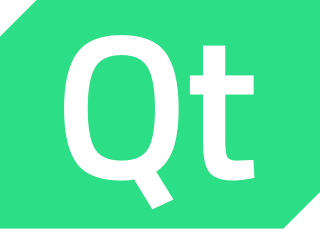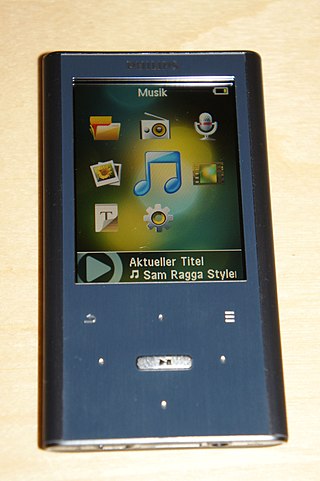
A Linux distribution is an operating system made from a software collection that includes the Linux kernel and often a package management system. They are often obtained from the website of each distribution, which are available for a wide variety of systems ranging from embedded devices and personal computers to servers and powerful supercomputers.

Qt is a cross-platform application development framework for creating graphical user interfaces as well as cross-platform applications that run on various software and hardware platforms such as Linux, Windows, macOS, Android or embedded systems with little or no change in the underlying codebase while still being a native application with native capabilities and speed.

IceWM is a stacking window manager for the X Window System, originally written by Marko Maček. It was written from scratch in C++ and is released under the terms of the GNU Lesser General Public License. It is customizable, relatively lightweight in terms of memory and CPU usage, and comes with themes that allow it to imitate the GUI of Windows 95, Windows XP, Windows 7, OS/2, Motif, and other graphical user interfaces.
unixODBC is an open-source project that implements the Open Database Connectivity (ODBC) API. The code is provided under the GNU GPL/LGPL and can be built and used on many different operating systems, including most versions of Unix, Linux, Mac OS X, IBM OS/2 and Microsoft's Interix.

The Personal Jukebox was the first consumer hard drive-based digital audio player. Introduced in 1999, it preceded the Apple iPod, SanDisk Sansa, and other similar players. It was designed and developed by Compaq Research starting in May 1998. Compaq did not release the player themselves, but licensed the design to HanGo Electronics Co., Ltd. of South Korea.
PLS is a computer file format for a multimedia playlist. It is typically used by media players for streaming media over the Internet, but may also be used for playing local media.

The Dell Digital Jukebox or just Dell DJ is a brand name for a series of digital audio players sold by the Dell corporation.
Music Player Daemon (MPD) is a free and open source music player server. It plays audio files, organizes playlists and maintains a music database. In order to interact with it, a client program is needed. The MPD distribution includes mpc, a simple command line client.
Gnokii is a suite of programs for communicating with mobile phones. It was initially only available for Nokia mobile phones, but later extended to support others. It is available for Linux, BSD unix, Windows, and Mac OS X, and as source code.

Philips GoGear is a series of small flash memory and hard drive-based personal electronic devices from Philips. The line includes digital cameras, digital audio players, and audio recorders. The GoGear line is named for the size of its products, all of which are rather small and portable. The digital audio players in the series were primarily designed to compete against the Apple iPod.

Linux is both an open-source Unix-like kernel and a generic name for a family of open-source Unix-like operating systems based on the Linux kernel, an operating system kernel first released on September 17, 1991, by Linus Torvalds. Linux is typically packaged as a Linux distribution (distro), which includes the kernel and supporting system software and libraries, many of which are provided by the GNU Project.

EasyTag is a graphical tag editor that is part of the GNOME project. EasyTag runs on Linux and Microsoft Windows, and there was an attempt to bring EasyTAG to OS X circa 2014. It is written in C and relies on GTK+ and id3lib for graphics and ID3 tag handling respectively. As of version 2.1.1, EasyTag also uses the tag manipulation library provided by the MAD project, for support of ID3v2.4.

The RioForge is a digital audio player that was produced by Rio Audio, Inc. While it competed in the same market as Apple Inc's iPod mini, it is considerably different as it plays from internal memory, SD card, or FM broadcast and runs on a single AAA battery.

Gnome Wave Cleaner (GWC) is a digital audio editor application. The graphical user interface for the editor has been produced employing GTK+ for the GUI widgets. Its primary author is Jeff Welty.

The Huawei E220 is a Huawei HSDPA access device (modem) manufactured by Huawei and notable for using the USB interface.

mpv is free and open-source media player software based on MPlayer, mplayer2 and FFmpeg. It runs on several operating systems, including Unix-like operating systems and Microsoft Windows, along with having an Android port called mpv-android. It is cross-platform, running on ARM, PowerPC, x86/IA-32, x86-64, and MIPS architecture.
fwupd is an open-source daemon for managing the installation of firmware updates on Linux-based systems, developed by GNOME maintainer Richard Hughes. It is designed primarily for servicing the Unified Extensible Firmware Interface (UEFI) firmware on supported devices via EFI System Resource Table (ESRT) and UEFI Capsule, which is supported in Linux kernel 4.2 and later. Previously, the initiation of UEFI firmware updates within an operating system could, on most systems, only be performed using Microsoft Windows or DOS-specific software. ESRT allows the firmware to expose updatable components to the operating system, which can pass a UEFI capsule with updated firmware for processing and installation on the next boot. Updates can be exposed via a command line tool, or within graphical package managers via a D-Bus interface.

AsteroidOS is an open source operating system designed for smartwatches. It is available as a firmware replacement for some Android Wear devices. The motto for the AsteroidOS project is "Free your wrist."